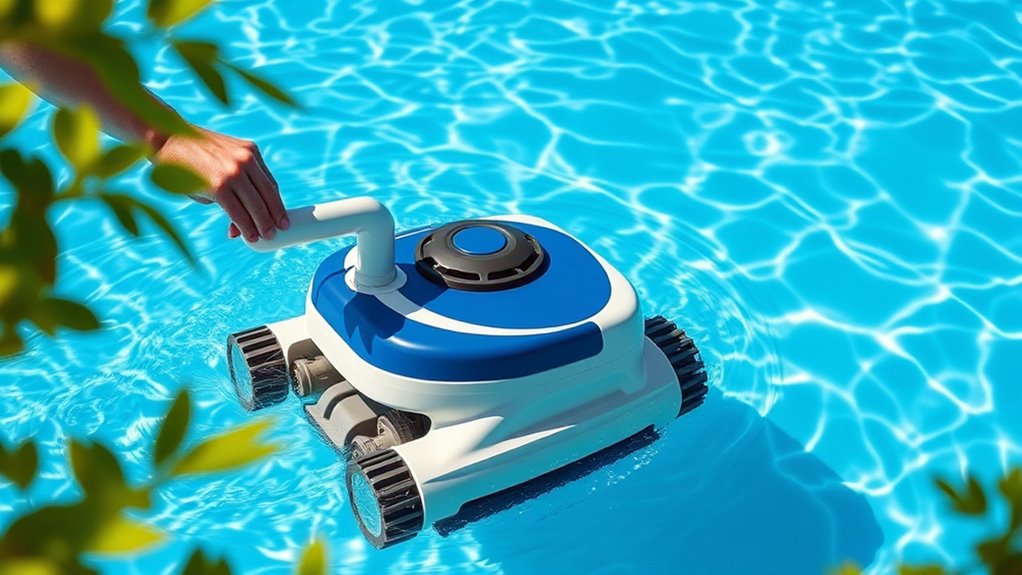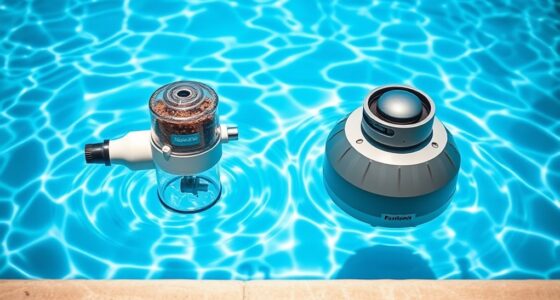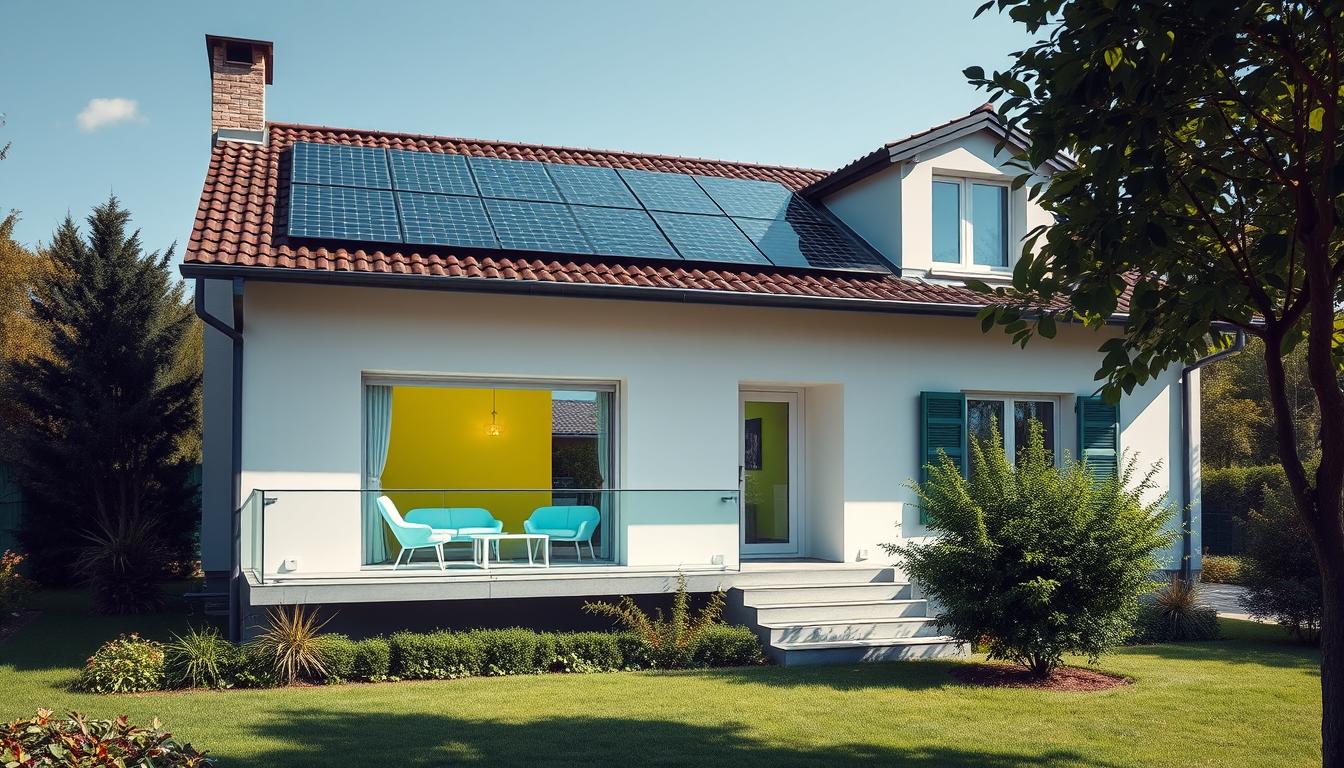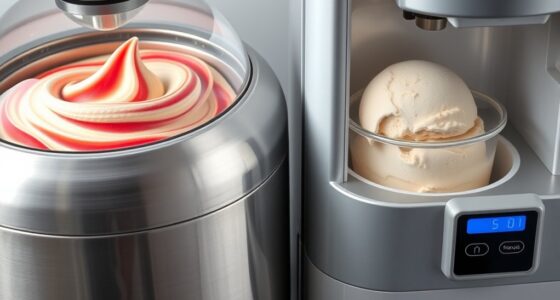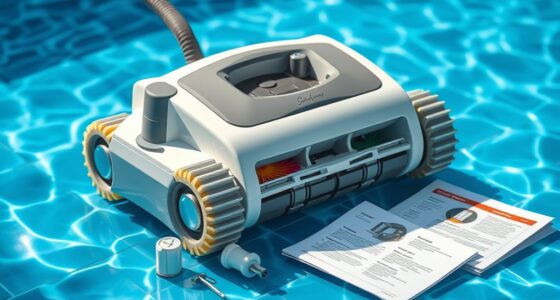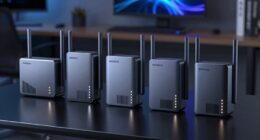To extend the lifespan of your pressure pool cleaner, perform regular inspections, clean and replace filters, and keep hoses and connections free of leaks or damage. Lubricate moving parts and store components in a cool, dry place when not in use. Address issues like clogs or worn parts promptly, and follow manufacturer maintenance guidelines. Proper care and timely repairs can markedly boost your cleaner’s durability, and staying vigilant can help you learn more about keeping it in top shape.
Key Takeaways
- Regularly inspect hoses, connections, and filters for damage or debris to prevent component wear.
- Perform routine lubrication and mechanical checks on motors and bearings to ensure smooth operation.
- Clean and dry all components thoroughly before storage to prevent mold, corrosion, and material deterioration.
- Replace worn or damaged parts proactively based on manufacturer guidelines to avoid unexpected failures.
- Store the cleaner in a cool, dry place away from sunlight and harsh elements to prolong its lifespan.
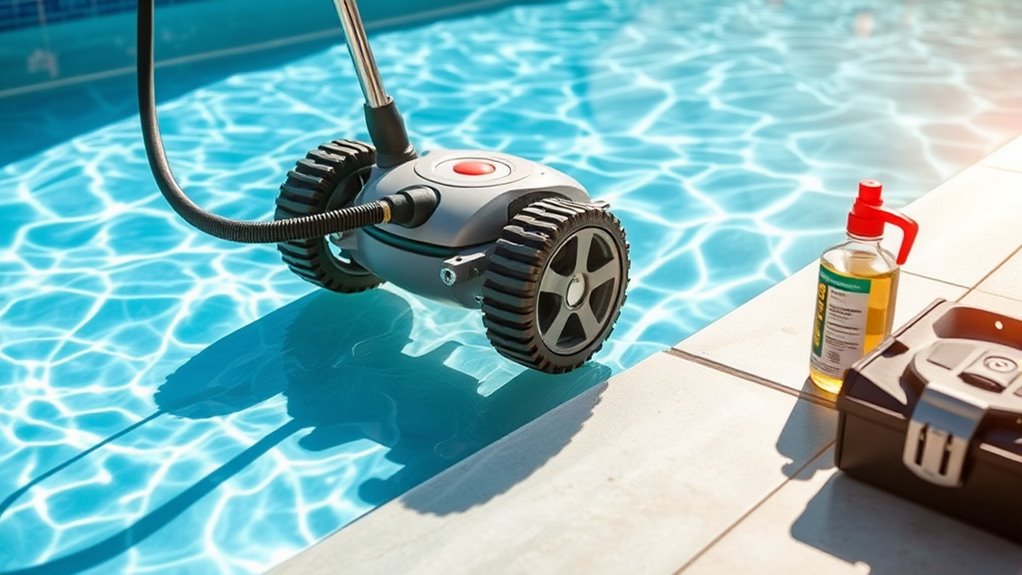
Pressure pool cleaners can be a valuable tool for keeping your pool spotless, but their lifespan depends on proper care and maintenance. To get the most out of your cleaner, you need to follow some straightforward maintenance tips. Regularly inspect hoses and connections for cracks or leaks, as small issues can quickly escalate if left unchecked. Keep the filters clean and free of debris, because clogged filters reduce efficiency and strain the motor. Also, ensure the inlet and outlet valves are functioning smoothly, adjusting as needed to maintain proper water flow. Lubricate moving parts periodically with manufacturer-approved lubricants to prevent wear and tear. When you perform these maintenance tips consistently, you reduce the risk of breakdowns and extend the cleaner’s operational life.
Additionally, monitoring the suction power and water pressure can help identify early signs of motor strain or blockages, contributing to longer equipment life. Proper water chemistry and regular cleaning of components can also prevent corrosion and buildup that might impair performance, aligning with the importance of corrosion resistance in maintaining equipment longevity.
Troubleshooting common issues is also essential to keep your pressure cleaner running smoothly. If you notice the cleaner is not moving or cleaning effectively, check the water pressure. Insufficient pressure can be caused by clogged hoses or filters, so clear any obstructions. Conversely, if the pressure is too high, it might lead to hose damage or leaks. In that case, inspect hoses for tears or pinholes and replace damaged sections promptly. If the cleaner is making unusual noises or vibrating excessively, examine the motor and bearings for signs of wear. Sometimes, debris lodged in the brushes or wheels can cause imbalance, so clear out anything stuck. When troubleshooting these common issues, remember to disconnect the power supply before inspecting or repairing parts to avoid injury.
Another key maintenance tip is to store your pressure cleaner properly when it’s not in use. Rinse it thoroughly with fresh water to remove chlorine, salt, or dirt, and let it dry completely to prevent mold and corrosion. Store hoses loosely coiled in a cool, dry place, avoiding direct sunlight that can degrade rubber and plastic components over time. During the off-season, consider giving your cleaner a thorough inspection and replacing worn parts preemptively, which can save you money and time later. Regularly checking filtration systems, such as filtration systems, including HEPA filters, ensures optimal performance and prevents debris buildup that can damage the motor or reduce cleaning efficiency. Incorporating routine maintenance checks based on manufacturer guidelines can also help prevent unexpected failures.
Frequently Asked Questions
Can Pressure Pool Cleaners Be Used in Saltwater Pools?
Yes, you can use pressure pool cleaners in saltwater pools. Just make certain they offer saltwater compatibility and corrosion resistance, as saltwater can be harsh on standard parts. Look for models designed specifically for saltwater environments, which typically feature corrosion-resistant materials. Regular maintenance and rinsing after use can also help prevent corrosion, extending your cleaner’s lifespan and keeping it functioning effectively in saltwater pools.
What Are the Signs My Pressure Pool Cleaner Needs Replacement?
Did you know that pressure pool cleaners typically last 3-5 years? If you notice your cleaner struggles with removing pool debris or starts missing spots, it’s a sign that the motor may be failing. Unusual noises or a decrease in cleaning power also indicate it’s time for a replacement. Addressing these signs early helps prevent complete motor failure and keeps your pool sparkling clean.
How Often Should I Replace Parts for Optimal Performance?
You should follow a regular maintenance schedule to keep your pressure pool cleaner in top shape. Typically, replace parts like brushes, hoses, and filters every 6 to 12 months, depending on usage. Keep an eye on signs of wear and tear, and don’t delay parts replacement, as it guarantees peak performance. Regular maintenance helps prevent breakdowns and extends the lifespan of your cleaner, saving you money and effort.
Are There Eco-Friendly Maintenance Options for Pressure Pool Cleaners?
Think of your pool cleaner as a guardian of clarity; it needs nurturing with eco-friendly solutions to serve longer. You can choose sustainable cleaning options like biodegradable brushes, energy-efficient motors, and natural cleaning agents. These eco-friendly solutions diminish environmental impact and help maintain your equipment’s longevity. By prioritizing sustainable cleaning, you ensure your pool stays pristine while honoring the planet, making every swim a reflection of mindful care and respect.
How Does Water Temperature Affect the Lifespan of the Cleaner?
The temperature impact on your pressure pool cleaner is significant. Warmer water can cause parts to wear out faster, reducing its lifespan, while colder water generally helps it last longer. Higher temperatures may also affect water quality, leading to buildup and clogging that strain the cleaner. To maximize your cleaner’s durability, monitor water temperature and maintain good water quality, ensuring it operates efficiently and lasts longer.
Conclusion
By properly maintaining your pressure pool cleaner, you extend its life and save money. Think of it as investing a little time now, so you avoid costly replacements later. Without regular care, even the best equipment quickly wears out, forcing you to buy new ones more often. The difference is clear: diligent upkeep keeps your cleaner running smoothly longer, proving that sometimes, simple attention is the most valuable investment for lasting performance.
